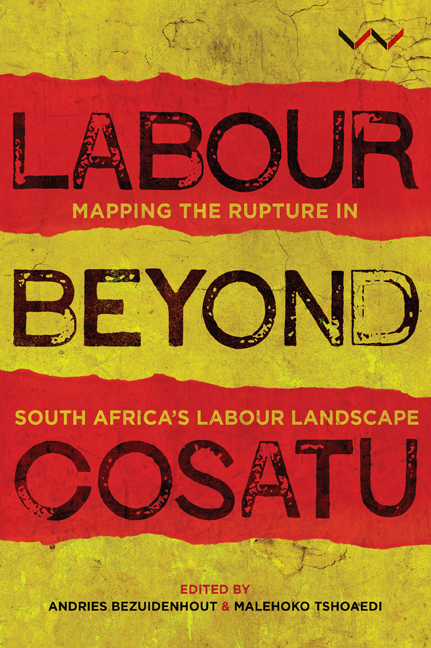Book contents
- Frontmatter
- Contents
- Figures and Tables
- Abbreviations and Acronyms
- Preface
- Chapter 1 Democracy and the Rupture in South Africa's Labour Landscape
- Chapter 2 Research in a Highly Charged Environment: Taking Democracy Seriously, 2014
- Chapter 3 The Social Character of Labour Politics
- Chapter 4 Is Cosatu Still a Working-Class Movement?
- Chapter 5 Labour Aristocracy or Marginal Labour Elite? Cosatu members' income, other sources of livelihood and household support
- Chapter 6 The Politics of Alliance and the 2014 Elections
- Chapter 7 Cosatu, Service Delivery, Civil Society and the Politics of Community
- Chapter 8 The Politics of Male Power and Privilege in Trade Unions: Understanding sexual harassment in Cosatu
- Chapter 9 Internal Democracy in Cosatu: Achievements and challenges
- Chapter 10 Public Sector Unions in Cosatu
- Chapter 11 Are Cosatu's Public Sector Unions Too Powerful?
- Chapter 12 Labour Beyond Cosatu, Other Federations and Independent Unions
- Contributors
- Index
Chapter 4 - Is Cosatu Still a Working-Class Movement?
Published online by Cambridge University Press: 21 March 2018
- Frontmatter
- Contents
- Figures and Tables
- Abbreviations and Acronyms
- Preface
- Chapter 1 Democracy and the Rupture in South Africa's Labour Landscape
- Chapter 2 Research in a Highly Charged Environment: Taking Democracy Seriously, 2014
- Chapter 3 The Social Character of Labour Politics
- Chapter 4 Is Cosatu Still a Working-Class Movement?
- Chapter 5 Labour Aristocracy or Marginal Labour Elite? Cosatu members' income, other sources of livelihood and household support
- Chapter 6 The Politics of Alliance and the 2014 Elections
- Chapter 7 Cosatu, Service Delivery, Civil Society and the Politics of Community
- Chapter 8 The Politics of Male Power and Privilege in Trade Unions: Understanding sexual harassment in Cosatu
- Chapter 9 Internal Democracy in Cosatu: Achievements and challenges
- Chapter 10 Public Sector Unions in Cosatu
- Chapter 11 Are Cosatu's Public Sector Unions Too Powerful?
- Chapter 12 Labour Beyond Cosatu, Other Federations and Independent Unions
- Contributors
- Index
Summary
INTRODUCTION
Members of Cosatu unions in our survey earned an average monthly income of R12 361.26, ranging from an individual who earned R45 000 a month to one who earned just R1 086. Of the entire sample, 25 per cent earned less than R6 800 per month and half earned less than R11 000 per month. There were also differences between Cosatu members who were members of public sector unions (average monthly income R14 108.58) and private sector unions (average monthly income R10 760.92). The households of more than 80 per cent of these union members were entirely dependent on wages for household incomes, with only 4.4 per cent reporting receiving child-care grants and fewer than 1 per cent receiving either old-age or disability grants. These wages supported on average 4.26 other household members, including children, as dependents (members of private sector unions supported more household members, an average of 4.39 dependents, whereas members of public sector unions supported an average of 4.05 dependents).
These figures illustrate the income diversity among members of trade unions historically affiliated to Cosatu. In an opinion piece in the Mail & Guardian, Loane Sharp (2014), an economist associated with the Free Market Foundation, argued that a ‘class war’ was behind the divisions in Cosatu that led to the expulsion of Numsa:
The middle class has fundamentally different values to the working class, including upward job mobility (as opposed to the working-class value of job security); home ownership; saving for retirement; independence from government financial assistance; and high-quality government services in policing, schooling and healthcare. The Numsa-Cosatu split, then, is much more complex than it at first appears. It is a battle for the heart of the ANC. It involves the long wave of South Africa's economic history. It sets the working class against the middle class in an epic battle of interests.
In this reading of the situation, Numsa members have a more radical working-class approach, whereas Cosatu, dominated by public sector unions, would have more conservative – or possibly liberal – values based on their interests rooted in the experience of class mobility.
There are clearly a number of limitations to this analysis which relates a complex set of issues to a distinction between a working class and a middle class. First, the alignment of the trade unions in the conflict contradicts the argument.
- Type
- Chapter
- Information
- Labour Beyond CosatuMapping the Rupture in South Africa's Labour Landscape, pp. 48 - 61Publisher: Wits University PressPrint publication year: 2017



